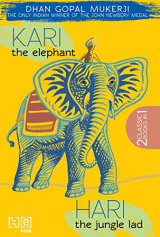Kari the Elephant
A nine-year-old boy raises and trains Kari the elephant, learning about the law of the jungle and the intelligence and the dignity of elephants.
Genre: Fiction
Genre: Fiction
- Year:
- 1922
- 3,106 Views
CHAPTER I BRINGING UP KARI Kari, the elephant, was five months old when he was given to me to take care of. I was nine years old and I could reach his back if I stood on tiptoe. He seemed to remain that high for nearly two years. Perhaps we grew together; that is probably why I never found out just how tall he was. He lived in a pavilion, under a thatched roof which rested on thick tree stumps so that it could not fall in when Kari bumped against the poles as he moved about. One of the first things Kari did was to save the life of a boy. Kari did not eat much but he nevertheless needed forty pounds of twigs a day to chew and play with. Every day I used to take him to the river in the morning for his bath. He would lie down on the sand bank while I rubbed him with the clean sand of the river for an hour. After that he would lie in the water for a long time. On coming out his skin would be shining like ebony, and he would squeal with pleasure as I rubbed water down his back. Then I would take him by the ear, because that is the easiest way to lead an elephant, and leave him on the edge of the jungle while I went into the forest to get some luscious twigs for his dinner. One has to have a very sharp hatchet to cut down these twigs; it takes half an hour to sharpen the hatchet because if a twig is mutilated an elephant will not touch it. When one goes into the jungle, one must remember that there are laws one cannot break. Do you know that anyone who is afraid or who hates one of the animals of the jungle gives out an odor which attracts tigers and wolves? Every day that I was afraid to go into the jungle, I did not dare to stay on the ground for fear lest the tigers would smell my presence and attack me. I climbed a tree instead, because when one is in a tree the odor of one's body does not go into the forest, and the animals cannot tell whether one is afraid or not. It was not an easy job, as you see, to get twigs and saplings for Kari. I had to climb all kinds of trees to get the most delicate and tender twigs. As he was very fond of the young branches of the banyan tree which grows like a cathedral of leaves and branches, I was gathering some, one spring day in March, when I suddenly heard Kari calling to me in the distance. As he was still very young, the call was more like that of a baby than an elephant. I thought somebody was hurting him, so I came down from my tree and ran very fast to the edge of the forest where I had left him, but he was not there. I looked all over, but I could not find him. I went near the edge of the water, and I saw a black something struggling above its surface. Then it rose higher and it was the trunk of my elephant. I thought he was drowning. I was helpless because I could not jump into the water and save his four hundred pounds since he was much higher than I. But I saw his back rise above the water and the moment he caught my eye, he began to trumpet and struggle up to the shore. Then, still trumpeting, he pushed me into the water and as I fell into the stream I saw a boy lying flat on the bottom of the river. He had not altogether touched bottom but was somewhat afloat. I came to the surface of the water to take my breath and there Kari was standing, his feet planted into the sand bank and his trunk stretched out like a hand waiting for mine. I dove down again and pulled the body of the drowning boy to the surface, but not being a good swimmer, I could not swim ashore and the slow current was already dragging me down. I clutched at reeds on the shore but they broke and the weight of the boy was tiring out one hand while the other was already weak from excessive swimming and clutching at the reeds. Seeing us drift by in the current, Kari who was usually so slow and ponderous, suddenly darted down like a hawk and came halfway into the water where I saw him stretch out his trunk again. I raised up my hand to catch it and it slipped. I found myself going under the water again, but this time I found that the water was not very deep so I sank to the bottom of the river and doubled my feet under me and then suddenly kicked the river bed and so shot upwards like an arrow, in spite of the fact that I was holding the drowning boy with my hand. As my body rose above the water, I felt a lasso around my neck. This frightened me; I thought some water animal was going to swallow me. I heard the squealing of Kari, and I knew it was his trunk about my neck. He pulled us both ashore. As the boy lay stretched on the ground I recognized the cowherd. He had gone to bathe in the river, had slipped too far out, and not knowing how to swim had almost been drowned. I put him flat on his face on the sand and the elephant put his trunk about his waist and lifted it gently up and down, and then up again. After doing this three or four times, the water began to come out of the boy's mouth and, not knowing what else to do because his body was cold, I slapped him very hard all over. After that I propped him up against the elephant's leg. Then the boy slowly came to. In the meantime all his cows had wandered away in different directions. As I thought some had gone into the jungle, where I was afraid they might be eaten up by tigers, I sent Kari to bring them back to the river bank. But Kari got lost himself; so when the cowherd had recovered entirely, I went to look for his cows and my lost elephant. Where do you think I found him? He had gone right into the forest where I had left the saplings and the twigs and had buried his trunk into the heap and was eating the best of them, without any concern for the cows, the cowherd or myself. But I could not punish him that day because he had done his duty by saving the life of the boy. Kari was like a baby. He had to be trained to be good and if you did not tell him when he was naughty, he was up to more mischief than ever. For instance, one day somebody gave him some bananas to eat. Very soon he developed a great love for ripe bananas. We used to keep large plates of fruit on a table near a window in the dining-room. One day all the bananas on that table disappeared and my family blamed the servants for eating all the fruit in the house. A few days later the fruit disappeared again; this time the blame was put on me, and I knew I had not done it. It made me very angry with my parents and the servants, for I was sure they had taken all the fruit. The next time the fruit disappeared, I found a banana all smashed up in Kari's pavilion. This surprised me very much, for I had never seen fruit there, and as you know, he had always lived on twigs.
Translation
Translate and read this book in other languages:
Select another language:
- - Select -
- 简体中文 (Chinese - Simplified)
- 繁體中文 (Chinese - Traditional)
- Español (Spanish)
- Esperanto (Esperanto)
- 日本語 (Japanese)
- Português (Portuguese)
- Deutsch (German)
- العربية (Arabic)
- Français (French)
- Русский (Russian)
- ಕನ್ನಡ (Kannada)
- 한국어 (Korean)
- עברית (Hebrew)
- Gaeilge (Irish)
- Українська (Ukrainian)
- اردو (Urdu)
- Magyar (Hungarian)
- मानक हिन्दी (Hindi)
- Indonesia (Indonesian)
- Italiano (Italian)
- தமிழ் (Tamil)
- Türkçe (Turkish)
- తెలుగు (Telugu)
- ภาษาไทย (Thai)
- Tiếng Việt (Vietnamese)
- Čeština (Czech)
- Polski (Polish)
- Bahasa Indonesia (Indonesian)
- Românește (Romanian)
- Nederlands (Dutch)
- Ελληνικά (Greek)
- Latinum (Latin)
- Svenska (Swedish)
- Dansk (Danish)
- Suomi (Finnish)
- فارسی (Persian)
- ייִדיש (Yiddish)
- հայերեն (Armenian)
- Norsk (Norwegian)
- English (English)
Citation
Use the citation below to add this book to your bibliography:
Style:MLAChicagoAPA
"Kari the Elephant Books." Literature.com. STANDS4 LLC, 2024. Web. 25 Apr. 2024. <https://www.literature.com/book/kari_the_elephant_392>.




Discuss this Kari the Elephant book with the community:
Report Comment
We're doing our best to make sure our content is useful, accurate and safe.
If by any chance you spot an inappropriate comment while navigating through our website please use this form to let us know, and we'll take care of it shortly.
Attachment
You need to be logged in to favorite.
Log In